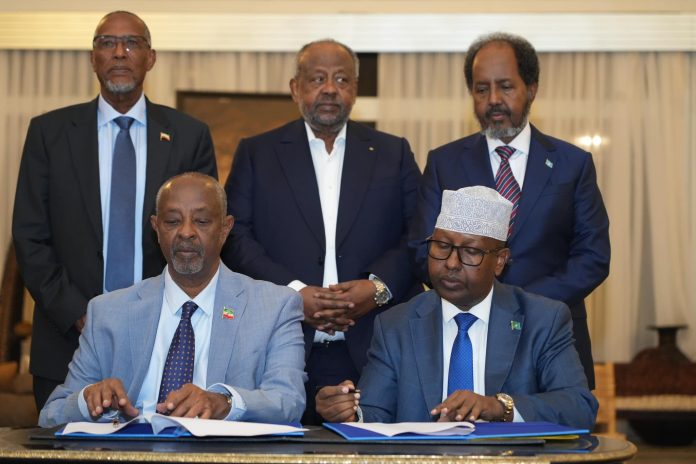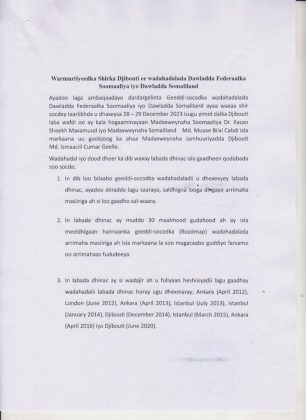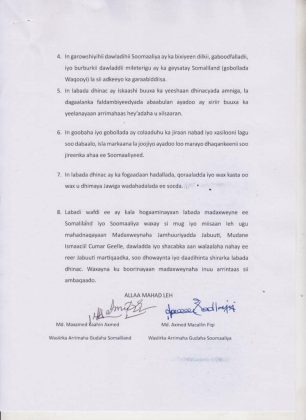MOGADISHU (KAAB TV) – On Friday, the Somali presidency, Villa Somalia, released a concise two-page communique signed by Somalia’s Interior Minister, Ahmed Moalim Fiqi, and Somaliland’s Interior Minister, Mohamed Kahin.
The accord, brokered by Djibouti’s dictator, Ismail Omar Guelleh, spans eight points, signaling a purported breakthrough after two days of negotiations.
The agreement outlines a commitment to resume talks within 30 days, establishing technical committees to oversee discussions.
Notably, both parties expressed a willingness to uphold past agreements from 2012 to 2020. These agreements have allowed Somaliland a unique “special arrangement,” enabling Hargeisa to receive international aid and development projects without passing through Mogadishu—a practice that, thus far, has yielded limited tangible outcomes despite being resource-intensive and time-consuming.
While the communique discreetly sidesteps the term SSC-Khatumo, the agreement underscores joint efforts in security cooperation, particularly in combating organized crime within the Sool, Sanaag, and Cayn regions—areas that witnessed a shift in regional authorities post the eight-month conflict between Somaliland and Dhulbahante fighters.
Somaliland’s insistence on Mogadishu’s non-recognition of the SSC administration as a federal member state finds a place in the accord, even though the wordings seemed different. However, the underlying issue persists—the inhabitants of Laascaanood and surrounding areas in SSC remain poised for their autonomous regional administration.
A proposed technical committee, tasked with facilitating talks and formulating a roadmap within 30 days, faces a daunting challenge. The effectiveness of such a committee hinges on its inclusivity of all clans and perhaps will need a parliamentary approval, a critical factor likely to impede progress.
Sources suggest an unspoken understanding on security collaboration beyond the agreement’s mention, involving issues such as oil exploration permits and the Berbera port military base—previously canceled by the U.S. earlier this year.
This development coincides with Ethiopia’s expressed interest in port access, extending to Somalia and Somaliland.
Mogadishu’s commitment to acknowledging the atrocities inflicted by Siyad Barre’s military government in the late 1980s marks a notable concession. Despite this, Somaliland maintains its pursuit of international recognition as an independent state.
A significant stipulation within the accord urges both parties to refrain from actions that could undermine the ongoing talks. However, skepticism arises concerning the feasibility of this agreement, given the absence of involvement from affected parties—most notably Puntland and SSC-Khatumo authorities, who have already voiced their opposition.
The path forward remains uncertain, leaving the potential ramifications of this accord hanging in the balance.




